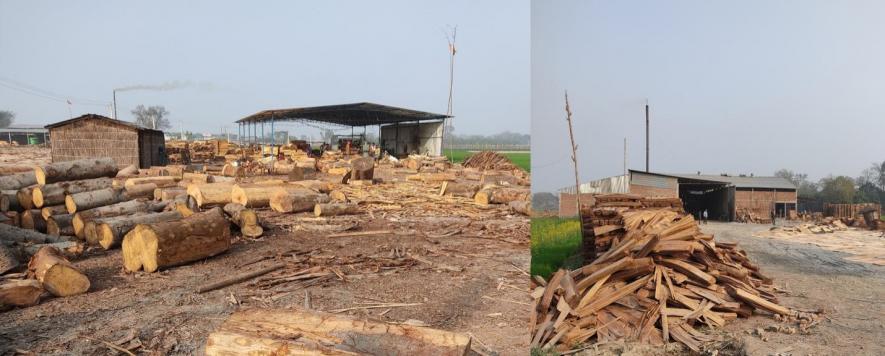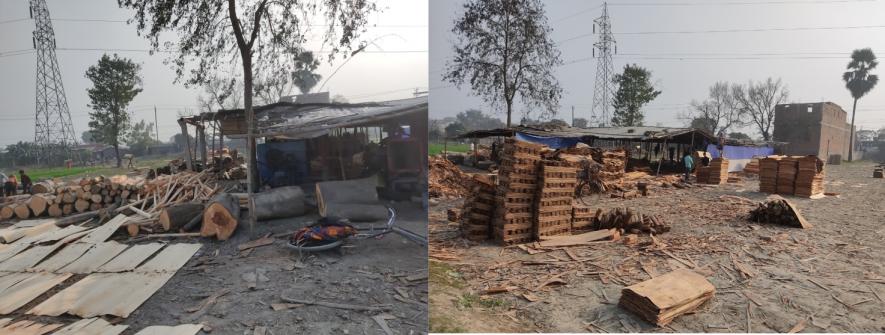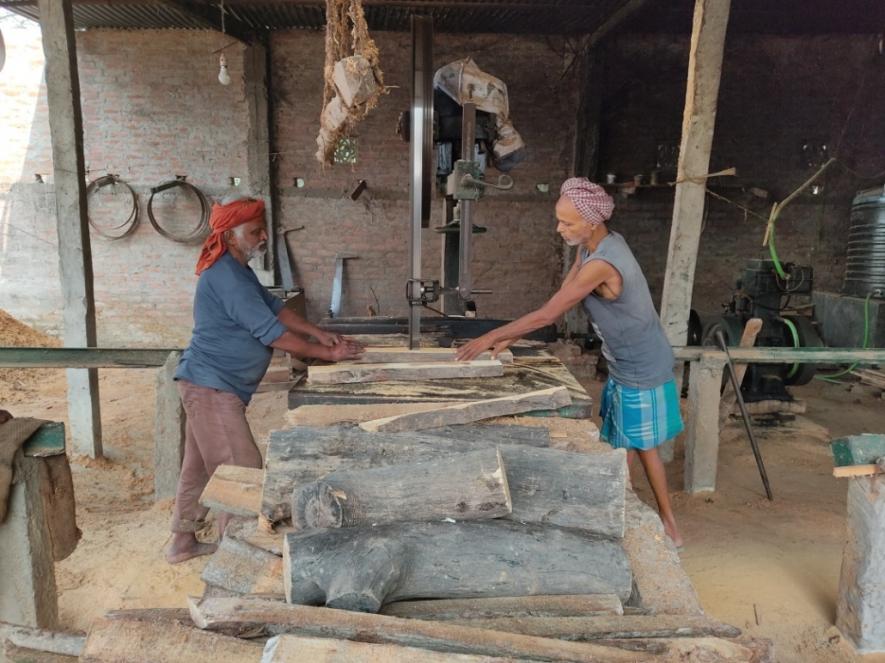Feeble Regulation of Wood Industry Could Threaten Nitish’s ‘Jal-Jeevan-Hariyali’ Mission

The growth of plywood, peeling and sawmills in Bihar’s domestic industry landscape may emerge as a new challenge for the state government. This sudden upsurge may impact Chief Minister Nitish Kumar’s pet ambitious project ‘Jal-Jeevan-Hariyali’ (Water-Life-Greenery), which aims at increasing the state’s forest cover from 15% to 17%.
The colossal rise in the clusters of wood processing units across villages is an unnoticed event for the state government. Pansalwa Wood Market (one of the largest in Bihar) is increasingly becoming a hotspot for wood traders. It used to have 100 wood related factories five years back, and their numbers have now shot to 750. Surprisingly, the consecutive rise in wood factories has not raised eyebrow of government officials.
The uncontrolled pace at which wood business is growing is a dual challenge for the state’s green cover and revenue generation. Motipur block in Muzaffarpur district, known as hotbed of wood industry, has handful of wood traders possessing license to run wood processing units. It comprises more than 1000 timber processing units (including saw mill, peeling) but only five of them are running with a license. The illegal network of saw mills is reported to be functioning at Bettiah, Bagaha, Valmikinagar, and Narkatiaganj of West Champaran district. Bettiah has 10 legal saw mills and rest 15 are functioning without license informed a district forest official on condition of not being named.
For illegal wood trading, Raxaul block of East Champaran is often used as a corridor to the international border of Nepal that provides scope for illicit high profiteering. Arshand Ahmad, a Raxaul based veener trader, concedes to the fact of growing menace by the wood mafia. Three weeks ago, high valued timber worth Rs. 40 lakh was seized by the Border Security Force in Raxaul, which is enough to prove the rising danger of unregulated timber and wood industries.
The state laws for the wood industry are the Bihar Saw Mills (Regulation) Act 1990, and the Bihar Saw Mills (Regulation) (Amendment) Act 2002, which say that no person engaged in wood-based industries will be able to establish and/or operate any wood based industry without a license under the act. In August last year, the government brought in the Bihar Wood Industries Investment Promotion Policy, 2020 with an aim to attract new investments and build a positive business ecosystem to improve existing saw mills, veener mills, plywood units and furniture units.
Officially, Bihar has a total of 2,272 licensed saw mills, 279 veener mills, 149 plywood industries, which form the base of the unorganised sector. Facilities given to wood industries by the state are thus underpinned by a mixture of policy dilemma i.e. exhortations of investment boost on one hand and breeding illegal business without crackdown on the other.

Unlicensed Peeling factories, East Champaran
Section 5 of the Bihar Saw Mills (Regulation) Act, 1990, states that no person shall establish a saw mill or a saw pit except under the authority and subject to the conditions of a license granted while many such saw mills are running day and night without any permission from government, said Sanjay Kumar, saw mill owner in Jeevdhara, East Champaran. He claimed trees at side of national highways are being illegally cut.
As per Ramsharan Ram, General manager Industries department Bhagalpur, the incentive levied to wood industry will bring back golden days of wood in the state without hurting the green cover. The Plywood Traders Association has lauded the initiative to boost investment in the wood sector and equally expressed concern. Association president Kishan Bhagat said that subsidies for large-scale plantation of commercial trees, such as poplar and eucalyptus, would attract investment but the government must reduce the GST from 18% to 5% as relief to the timber industry in backdrop of the loss incurred during the COVID-19 lockdown.
West Champaran in north and Gaya in south Bihar recently witnessed crackdown on illegal cutting of trees in the dense forest regions. Recalling the crackdown over saw mills, Umesh Prasad Ram, the forester in Sherghati region, said that nine illegal saw mills were seized and claimed there were more active illegal saw mills. Evading government rules to illicitly run a wood factory is turning into a new norm while harming the greenery of the district, added Ram.
On condition of anonymity a state forest department officer revealed that growth of illegal wood processing units is two dimensional. The first involves illegal slaying of trees near dense green covers like hilly and forest regions and second works through setting up of wood based factories and small wood processing outlets in far flung areas. Jamui, Gaya, Jehanabad, Rohtas, Bettiah, Valmikinagar, Purnea, Araria, Kishanganj and Muzaffarpur are hotspots of rising unlicensed wood factories.

workers processing wooden logs in a sawmill.
Babu Lal and Banarsi Ray in Motipur (Muzaffarpur) have been working in wood industry since three decades witnessing its topsy turvy rise. As per their experience, the contemporary rise in number of saw mill or peeling without government intervention is unprecedented. The closure of unlicensed wood processing units in Uttar Pradesh had opened a Pandora box to state wood traders who have got a free hand to buy first grade machines at half rate.
The above disclosure partially exposes government’s double speak on raising green cover in name of jal-jeevan-hariyali and to its contrary the rampant flourish of saw mills and peeling evading the government license procedure.
Mohammad Anas (50), one among the few in Muzaffarpur who have been running saw mill since the mid 90s, endorsed licensed wood factories. He said, “Establishing a saw mill, a peeling or plywood factory in the record book of the government gives me an opportunity to seek help from it in form of subsidy and loans. It paves path of business expansion that further opens door to more employment at rural level. But wood traders in reality have to fend for oneself till date.”
The wood business in Seemanchal i.e. Araria, Purnea and Kishanganj has taken a U-turn in West Bengal bordering block of Kishanganj i.e. Pothiya. As locals claim, getting license is a complex process for wood traders and the government officials allegedly seeking under hand favour pushes setting up of units outside the state in nearby areas of West Bengal.
Besides controversial flourishing of the wood industry, its informal nature remains an underrated issue that involves a huge workforce irrespective of gender and age. The factories largely involve women and child labour engaged in veneer picking and transporting small wooden logs.
Sarita Devi (40), engaged in veneer drying, told Newsclick that last year’s lockdown imposition was a severe blow to the daily wage earners as timber units remained shut. After mills resumed work, the increasing cost of livelihood started making it harder for such people to sustain with low wages, she said. Women labourers daily earn Rs 150, and for men it is Rs 250-300, and with the low wages, the saw mills, plywood and peeling units multiply profit.
The lack of regulation and check and balance in the wood-based industry would ultimately be disastrous for the forest cover despite government publicity to save the green cover. The Supreme Court in 2014 directed a complete shut down of all unlicensed wood-based industries, but isn’t followed in Bihar.
Get the latest reports & analysis with people's perspective on Protests, movements & deep analytical videos, discussions of the current affairs in your Telegram app. Subscribe to NewsClick's Telegram channel & get Real-Time updates on stories, as they get published on our website.
























